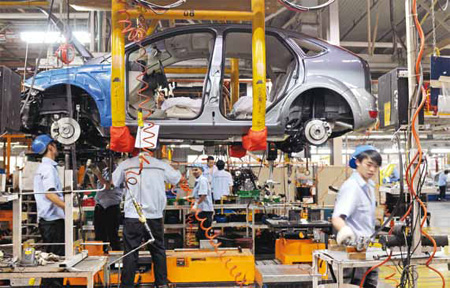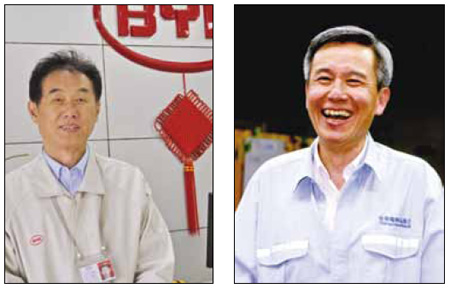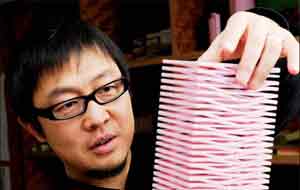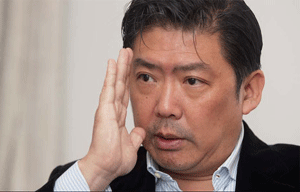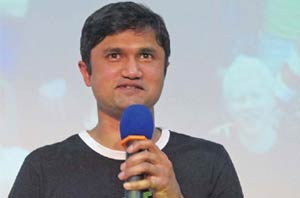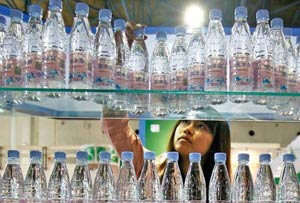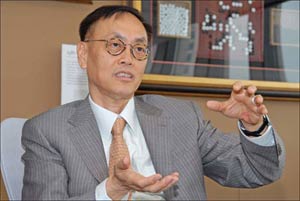Labor force quality remains big draw
Updated: 2011-10-21 08:59
By Andrew Moody and Hu Haiyan (China Daily)
|
|||||||||
|
Ford's joint venture plant in Chongqing, which assembles the Ford Focus, Mondeo S-MAX and Volvo cars. Zhong Guilin / for China Daily |
|
Left: Liu Zhenyu, BYD's general manager in Xi'an. Right: Frank Chuang, executive director of manufacturing for Changan Ford Mazda Automobile. Photos Provided to China Daily |
Frank Chuang insists human beings are more flexible when it comes to car production. The executive director of manufacturing for Changan Ford Mazda Automobile (CFMA) was pointing to an assembly line worker fitting a windscreen on one of the company's production assembly lines in Chongqing.
"There is a greater use of labor here than in Detroit where the production process is more automated," he says.
"If there is a problem in an automated system, everything would shut down. Human beings are more flexible and would be able to respond to problems."
Chuang was speaking at CFMA's assembly plant at Yuanyang New Town in Chongqing's New Northern Zone, which has more of the feeling of a huge barn rather than a state-of-the-art facility.
It employs 4,000 people on the site, which opened in 2002, and assembles the Ford Focus, Mondeo S-MAX and Volvo cars.
The average age of the workforce, which includes many women on the assembly line, is between 27 and 28 and the average salary 1,700 yuan ($267, 194 euros) a month, significantly less then coastal areas of China and just a fraction of Western labor rates.
"It is not just the lower labor costs that bring us to Chongqing. The people here are good workers. That is why they are in demand in other parts of China," says Chuang.
"There is also less competition for labor than in Guangdong, where you have Honda and Toyota and some other brands. You have to spend more to attract workers."
Ford, through its China joint venture company, is one of the multinational companies to fully embrace manufacturing in the west of China.
It is currently building three more factories in Chongqing as part of a $1.6 billion investment.
Such investment will add to China's already massive automotive manufacturing base, which has led to the country being the world's largest car producer.
Chinese carmaker BYD also produces two-thirds of its cars in the west of China at its modern facility in Xi'an.
It is one of the few mainstream manufacturers on the Xi'an National Hi-tech Industrial Development Zone, which is dominated by technology companies.
There it produces 300,000 cars annually, some of which are natural gas vehicles.
The company is headquartered in Shenzhen, where it has its other manufacturing plant, and began production in Xi'an after a merger with a local company.
Liu Zhenyu, BYD's general manager in Xi'an, says the move to the west was not motivated by cheaper labor.
"The cost of labor is not a major consideration for us. I think if a company places too much emphasis on this, it is a rather weak company," he says.
He says the company was attracted by the quality of the labor force, 1 million of Xi'an's 10 million population being students who could provide the skilled workforce to drive the company forward in future.
Liu says the National Hi-tech Industrial Development Zone, which itself is a product of the government's go-west campaign to encourage more firms to set up in the west of China, is also an added incentive. Firms located in the zone benefit from tax reductions.
"It is no exaggeration to say companies are endowed with a perfect environment to grow here," adds Liu.
The BYD plant appears to be a more modern facility than the Ford assembly site in Chongqing.
"There is a trend in China to use both relatively cheap labor as well as robots. The two are not contradictory with each other. Any factories we build in the future will use dozens of robots," he says.
Eric Thun, an automotive manufacturing expert and lecturer in Chinese business studies at the Said Business School at Oxford University, says there was a tendency for Chinese carmakers to make greater use of automation.
"Sometimes a complaint you have in joint venture companies is that the Chinese partner wants the latest and greatest technology but often it is not the most suitable to the task," he says.
"A company like Ford will be thinking very carefully about the product they are producing and the level of technology they need to produce that product most effectively."
Being labor-intensive does not slow production at the Ford assembly plant at Chongqing, which produces 40 vehicles an hour or one every 90 seconds. There are two main shifts, 8 am to 5.50 pm and 6 pm to 2 am.
Su Yulong, 29, an assembly line leader, from Chongqing, has been working for the company for nearly eight years after leaving the army.
He is married, with a 2-year-old son and while his wages might be low compared to workers in the country's richer eastern coastal regions, they more than provide for his family.
"The prospects for personal development are good here and the salary is also good compared with other work in the area," he says.
"I am certainly better off than my parents' generation. Living standards are a lot higher and I am able to go away on holiday regularly."
Being inland from the coast does not present a major logistical problem for Ford with them being transported by road, rail or by boat on the 1,000-km journey on the Yangtze River to Wuhan, from where they are distributed.
Chuang, who has worked for the company in Taiwan and India before arriving in Chongqing in 2003, says there are no components from Ford's United States home base that go into the manufacturing process.
"Around 60 percent of what goes into the car is manufactured locally and we would like that to increase to 100 percent to get rid of supply inefficiencies," he says.
Liu at BYD believes Chinese companies are also playing a major part in developing a strong automotive manufacturing base in China.
"Now we have learned how to manufacture general cars, I think it is hard for others to compete in this sector," he says.
